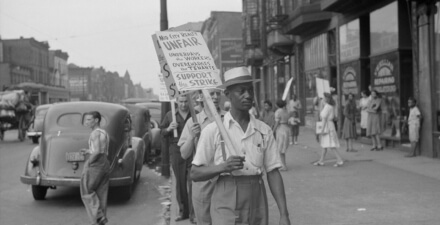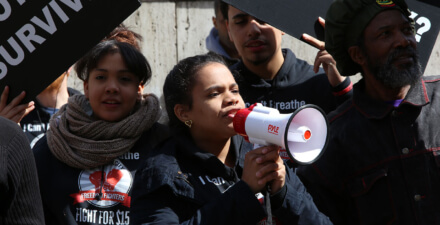The future of work and worker power post-COVID a key topic at the 2021 Labor and Employment Relations Association annual conference

Last week, the Labor and Employment Relations Association, or LERA, held its 73rd annual conference. The virtual event, which took place over four days, featured more than 350 presenters from across disciplines, focusing on workers, worker power, and the workplace in a time of division and disruption. Speakers and participants from labor, management, government, advocacy, and academia attended the more than 85 sessions, from plenaries and workshops to skill-building and networking opportunities.
The interdisciplinary approach to the conference offered a chance for Equitable Growth and our network to deepen and broaden our network of scholars, as well as raise awareness of our work with representatives of diverse interests and fields. Equitable Growth grantees and members of our broader academic community were featured in at least 15 different plenaries, panels, and paper sessions.
- At a plenary session on how COVID-19 will shape the future of work, Equitable Growth Research Advisory Board member and economics professor at the Massachusetts Institute of Technology David Autor discussed how labor markets have been and will continue to be affected by the coronavirus pandemic and recession. He predicted a greater shift to teleworking, but also cautioned that these benefits will be unequally distributed, with high-wage, higher-educated, and urban workers more likely to be able to continue working from home.
- At another plenary session, on addressing the challenge of racial equity and justice in the workplace, Darrick Hamilton, an Equitable Growth grantee and Henry Cohen professor of economics and urban policy at the New School, emphasized the need for a redefinition of what constitutes economic well-being in the United States, a recognition of the expanded racial wealth gap and occupational segregation amid the coronavirus pandemic, and a decoupling of labor policy from industrial and trade policy.
- At a panel session on unequal workplace bargaining power and policy solutions to rebalance this dynamic, Equitable Growth grantee and professor of economics and international and public affairs at Columbia University Suresh Naidu discussed evidence on employer wage-setting and how raising the minimum wage can have a neutral effect on employment.
- In the same panel, Alexander Hertel-Fernandez, an Equitable Growth grantee and now the U.S. Department of Labor’s deputy assistant secretary for research and evaluation, examined new research on the role of workplaces as civic spaces, allowing workers to interact with peers who share different views and learn new skills that translate to civic participation. Hertel-Fernandez’s research also explores how unions can get involved by providing opportunities for civic education, training, and skill-building.
- A panel chaired by Equitable Growth grantee and Harvard University’s Daniel Schneider featured Director of Family Economic Security Policy Alix Gould-Werth as a discussant and several grantees who presented research. The panelists highlighted their findings on how workers have weathered the coronavirus pandemic and recession, including the disparate impact on workers of color, the consequences of unemployment and impact of Unemployment Insurance on service-sector workers, and the effects of unpredictable schedules on workers amid COVID-19 public health restrictions.
The Washington Center for Equitable Growth also organized four sessions for attendees with participation from staff and network members, as well as non-network experts. Panelists and speakers included both well-established and early career scholars from across disciplines and demographic groups typically underrepresented in economics and social sciences, tied together by the goal of fostering an equitable economy.
- A panel session on racial and regional inequality chaired by Equitable Growth Labor Market Policy Analyst Kathryn Zickuhr featured grantee Robert Manduca of the University of Michigan, Chris Becker of Stanford University, Jaimie Worker of the Economic Policy Institute, and Zoe Willingham of the Center for American Progress. Manduca highlighted two important yet alarming trends in the United States: lack of progress in the reduction of racial economic inequality and growing geographic inequality between U.S. regions. Becker then explained how politicians use racist rhetoric in speeches about economic issues, which further entrenches racist policy. Worker discussed how preemption of pro-worker ordinances in the South holds back progress for Black workers, workers of color, women workers, and low-income workers. And Willingham brought up the diversity of rural communities and why researchers must adopt a racial justice lens when studying rural poverty.
- In a panel session on worker surveillance and workplace control, Zickuhr presented research on how surveillance harms workers and what this means for policy solutions. She was joined by Alexandra Mateescu of the Data & Society Research Institute, who detailed her research on worker monitoring schemes in the domestic care industry; Luke Elliott-Negri of the City University of New York Graduate Center and a 2020 Equitable Growth grantee, who spoke about workplace collective action in platform businesses such as Instacart; and Equitable Growth grantee Jasmine Hill of Stanford University, who covered workers of colors’ challenges navigating the labor market in the information age.
- Equitable Growth’s Director of Labor Market Policy Kate Bahn chaired a panel session about research on monopsony, labor market concentration, discrimination, and wage-setting norms in the United States. Bahn presented her co-authored policy report on racial and gender wage discrimination and U.S. worker exploitation; University of Pennsylvania’s Ioana Marinescu’s essay on boosting wages in noncompetitive labor markets, published recently in Equitable Growth’s Boosting Wages for U.S. Workers in the New Economy; and Ellora Derenoncourt’s Equitable Growth-funded research on the spillover effects of voluntary employer minimum wages. Then, SEIU’s Ahmer Qadeer and Towards Justice’s David Seligman joined for a roundtable discussion of monopsony and workplace fissuring, and policy solutions to correct unequal labor market outcomes.
- Equitable Growth also organized a panel on labor market opportunity and economic security for Native Americans chaired by the AFL-CIO’s William Spriggs and featuring research presentations by Equitable Growth grantees Randall Akee of the University of California, Los Angeles and Blythe George of the University of California, Berkeley, as well as Jeffrey Burnette of the Rochester Institute of Technology. The symposium highlighted the limited data available to study workforce participation and income security among Native Americans, which has led to a lack of research that centers the unique experience of these communities, and demonstrated that cultural awareness, additional studies, and targeted policies would foster greater economic well-being and opportunities.
This year’s conference was an important opportunity for Equitable Growth to expand our network of interdisciplinary scholars and to learn about cutting-edge research on workplace dynamics, worker power, and inequality in this unprecedented era of modern history following the coronavirus recession. The papers presented and topics discussed will certainly inform our work as we navigate the economic recovery. We look forward to exploring additional opportunities for engagement and collaboration with LERA and at future conferences.






